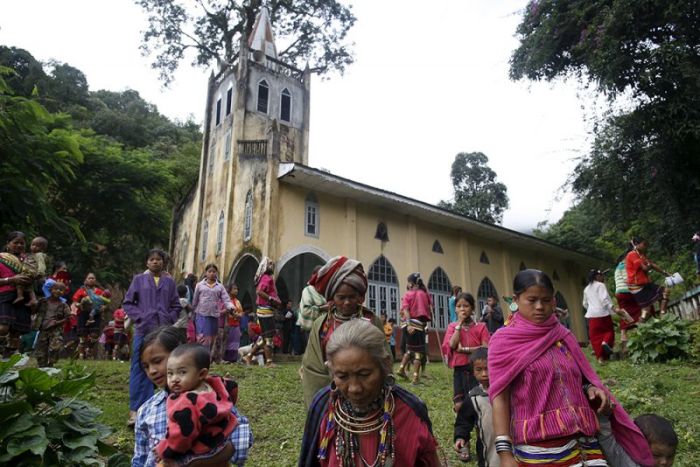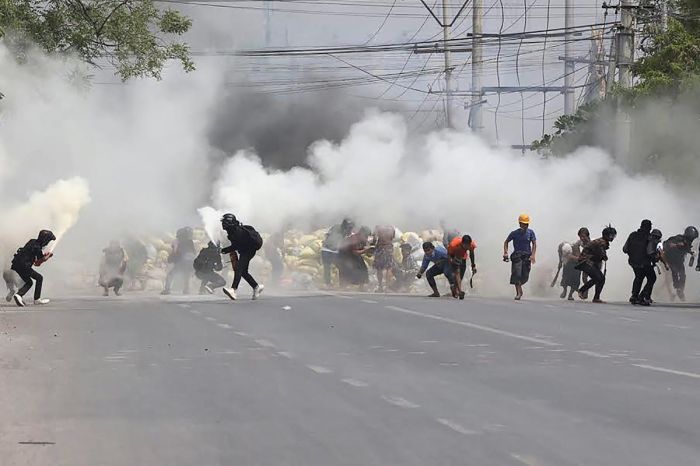Myanmar Christians face increased persecution under military rule since coup, experts say

Christian and other ethnic minorities in Myanmar face even greater danger since the southeastern Asian country fell under the Tatmadaw military rule due to the Feb. 1 coup that toppled the civilian government and initiated a wave of violence, experts warned this week.
United States-based international religious persecution watchdog International Christian Concern hosted a panel discussion Thursday focusing on the increased hardships Christians endure. Panelists discussed ICC's new report, “Caught in the Crossfire: Myanmar's Christian Minorities Under Tatmadaw Rule.”
"Violent incidents are escalating, with airstrikes and ground fighting spreading to various regions around the country. Tens of thousands have fled, and many more are sure to follow in the months ahead," the report explains. "Instability, food shortages, and great loss of life threaten the Burmese people — especially its vulnerable minorities."
Myanmar, also known as Burma, is home to several Christian minority groups, including those within the Kachin, Chin, Rohingya and Karen communities. The report also touches on Christians in the Wa state, ethnic Indian and Chinese Christians and Karenni Christians in Kayah State.
Myanmar is predominately Buddhist, while Christians make up around 6.2% of its 54 million population. Buddhism is recognized as the state religion.
Christians, however, are not the only group persecuted by the Tatmadaw military, as many minority groups are suffering from religious freedom violations.
“No ethnoreligious minority has been safe from persecution or discrimination," Nadine Maenza, chair of the U.S. Commission on International Religious Freedom, said during the panel discussion. "Since the Feb. 1 coup, the situation, however, has deteriorated significantly."

Maenza urged the international community to pay attention and act against the atrocities religious minorities suffer in Burma as it struggles as a democracy.
Despite an election last November, the Tatmadaw military refuses to accept the result and has alleged voter fraud. The military declared a yearlong state of emergency and put its civilian leaders under house arrest.
The military-led Feb. 1 coup has led to widespread violence, protests and worsened conditions for religious minorities.
In recent months, churches have been damaged or destroyed by military shelling as thousands of displaced individuals have taken shelter in churches when their villages have come under attack.
Last month, the United Nations estimated that as many as 100,000 people were displaced due to increased fighting in the Kayah state, including "indiscriminate attacks by security forces against civilian areas." The international body expressed concern over the “rapidly deteriorating security and humanitarian situation” in the Kayah state and other areas in southeast Myanmar.
"The increased attacks on churches show the hostilities the Tatmadaw has towards Christianity and its disregard for human lives," the ICC report reads.
David Eubank of Free Burma Rangers is on the ground in Burma serving in ministry.
He offered a glimpse into the crisis unfolding and the constant danger. He shared a recent story of being shot at by the military while attempting to plant rice.
Eubank said direct humanitarian assistance, political recognition from the international community and intervention are needed in Myanmar.
The country is ranked No. 18 on Open Doors USA's 2021 World Watch List of countries where Christians face the most severe persecution. The persecution level in Myanmar is “very high” due to the religious nationalism that places increasing emphasis on Buddhism.
Due to the deteriorating condition of Burma’s democracy and its lack of peace, human rights activist Benedict Rogers, the East Asia team leader of Christian Solidarity Worldwide, said the response to Burma’s worsening situation must be long-term.
“The type of pressure needs to be as intense and targeted as possible," Rogers advised. "But it also should be as sustained as possible, recognizing that this is probably going to be a long, strong struggle or a long new chapter in Burma’s ongoing struggle. So it is going to be both intense but also sustained."
ICC’s report offers recommendations to the international community to impose sanctions, create a cohesive bloc, support the National Unity Government and pressure the Tatmadaw’s allies.
“The protection of Myanmar’s many ethnic and religious minority groups, long persecuted by the Tatmadaw, is a critical matter and one that must rank high on the international community’s list of priorities,” the report states.
ICC Regional Manager for Southeast Asia Gina Goh, one of the authors of the report, warns that the "chaos caused by the coup is not likely to cease for the next few months or even years."
“We have already witnessed the targeting of churches and religious leaders in states such as Chin and Kayah by the Tatmadaw,” she said in a statement. “As the resistance forces fight on, there could be tens of thousands more IDPs who direly need humanitarian aid and medical help. We should not stand idle.”
Emily Wood is a reporter for The Christian Post. She can be reached at: emily.wood@christianpost.com





























